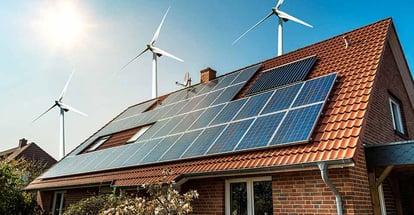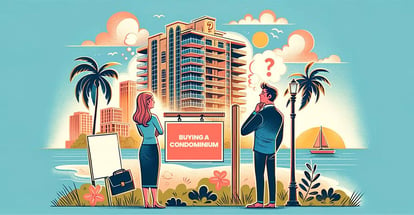The Pros and Cons of Purchasing an Old House vs. New House in Florida
Getting the correct answers to your questions often determines which home you'll choose to buy by providing a guideline you can follow. To arrive at the best decision, you'll have to balance the must-haves and nice-to-haves. However, this isn't always easy, but it can help prevent unavoidable surprises that may spring up down the road.
Lucky for you, we are here to help, and we'll start by answering the most basic question. Would you instead buy an old house or a new house? What are the pros and cons of making either decision and which could be the better option for you? Getting the best and most detailed answers to these questions is a solution to half the problem.
It would help if you considered how old a home is when making your purchase. It is important since differences arise regarding safety, cost, and upkeep. Compromising one for the other can lead to various problems down the road. Thus, you should take your time, assess your options, and determine whether you'll be making the right choice.
Definition - Old Homes Vs. New Homes
The quality of building construction has evolved over the years. It has improved and become better because of improved technology and readily available building materials. Additionally, construction has also gotten better because of updated building codes.
For instance, the federal government banned lead-based paint in 1978, a common practice before then. Updated technology, insulation, plus varying and readily available building materials have changed building construction by a considerable margin. Newer buildings are ultimately better and safer compared to old ones.
However, on the other end of the scale lies historical homes. These homes are monitored and recognized by the NPS (National Park Service) for their historical significance. Buying such homes brings various unique advantages and disadvantages. However, it would help to remember that all old homes don't have a historical significance because they were built long ago.
Properties considered historic homes fit preset criteria connecting the home to various historical events or people. Thus, old homes provide you with some form of old-world comfort minus all the bureaucracy involved with owning historic properties.
On the other hand, newly built homes are often bigger and equipped with all the facilities you'd expect to have in a modern home. That said, Old and new homes lie over a wide range of years. Thus, for this article, we'll define old homes as older than 50 years but less than 100.
Pros of Buying an Old House
Buying old (50 to 100-year) homes has several advantages. Many homeowners still prefer old houses despite the technological advancements in home construction, and you can't blame them. Old homes have a certain appeal that relaxes you by taking you back a decade or two. They have a certain personality and charm that intrigues buyers. They include:
Architecture
Most people love old houses because of their architecture. They are committed to their architectural individuality, making them stand out—many types of homes with old architecture, including colonials, Victorians, and Tudors. They stand out compared to the numerous "cookie-cutter" houses cropping up all over the US.
These homes aren't replicated today, with more people leaning towards modernistic designs. Additionally, it's rare to find artisans with the necessary skills and attention to detail to build such homes. Often, if you prefer these types of homes, you have no option but to buy them.
Mature landscaping
Old homes often come with larger yards because the land was cheap. This is often beneficial if you have a big family or plan to do some projects since it provides you with more usable space than you'd get from modern homes. Additionally, old homes were designed with lavish landscaping consisting of bushes and trees carefully cared for over generations.
Such homes often provide a peaceful aura that could benefit individuals who want a laid-back lifestyle away from all distractions that come from modern home designs. However, the downside is that the mature landscaping increases the home's value, and you'll be forced to fork out more than you would for modern homes.
Long purchase history
Knowing your home's purchase history is critical when determining its value. For instance, you could use the home's purchase history to determine whether your home will be an asset or a liability. However, you should still take the information as an advisory rather than a fact since there is a chance that it could depreciate in the future.
Buying new homes is a long-term gamble that buyers often hope will work out. On the flip side, newer homes have a shorter paper trail than old homes. This can be a bit risky if you plan on making a long-term investment because you won't be able to predict whether it'll appreciate or depreciate.
Established neighborhoods
Often, most people prefer what types of neighborhoods they'd like to live in. For instance, all people prefer living in locations with no (to minimal) violence depending on the cost of purchasing a home. This can be hard to determine with new homes. Old homes paint a clearer picture of the surrounding neighborhood.
Buying your home involves understanding your neighborhood and determining whether it'll be a good fit for you. Such homes tend to be centrally located in stronger communities and closer to downtown, making it nearly impossible to undergo zoning changes. This can be an added advantage for homeowners that choose to buy such houses.
Lower cost
You may be paying more for their individuality and charm; however, they cost way less than new homes when it comes to upfront costs. Often, new homes cost up to 30% more than old homes. Therefore, purchasing an old home could be beneficial as long as you are ready to pay any other costs that may arise later on.
Additionally, old homes may cost less because of repairs and renovations. This reduces their pricing significantly compared to new homes. However, the downside is that you may be forced to make the repairs and renovations yourself, which can be pretty costly. Therefore, you'll have to inspect individual homes to determine if the price is worth it.
Cons of Buying an Old House
There are benefits and potential drawbacks to each home purchase decision. Both should be considered when deciding to avoid getting the short end of the stick.
Thus, it would help if you remembered that there is no black and white answer to determine what is best for you when analyzing your decision. It would help if you considered some of these downsides when making your decision. They include:
Maintenance costs
Old homes are designed from old materials that weren't as strong as those used currently. Additionally, said materials have stood the test of time, making most of them naturally weak. Thus, there is a chance that purchasing old homes puts you in a position where you'll have to do frequent repairs and maintenance.
For instance, your home can have sloping floors, faulty plumbing, etc. Thus, there is a chance that you'll have to do lots of projects to keep your home safe and comfortable. However, you could capitalize on this to get lower upfront costs. You could use this cash to supplement maintenance costs.
Smaller floor plan
Older homes have smaller floor plans compared to modern homes. Modern homes have more extensive, open floor plans because of an increasing demand that wasn't common in earlier decades. There was a significant difference in day-to-day life in the past which didn't necessitate the need for bigger rooms.
You'll have to decide whether you'll renovate your home to fit your possessions (if you have lots of them) or get rid of some. Additionally, people didn't have many physical possessions as they do now. Thus, you should expect smaller rooms, lower ceilings, smaller closets, and minimal room for appliances when buying older homes.
Utility costs
Improvements in building codes have improved how modern homes are built. Newer homes have benefited from said changes, including increased insulation allowing them to retain heat or allow in cold air depending on changing seasons. This isn't the case with older homes. Thus you'll need to choose whether you'll have to renovate or live in the home as-is.
The CBAHS (Census Bureau's American Housing Survey) estimates that most homeowners living in old homes spend more money on electricity and gas yearly. This can become problematic over time, and you'll have to figure it out before purchasing your home.
Fewer safety regulations
Newer homes are better than older homes because of changes in construction standards. Most old homes weren't built to code, making them less likely to withstand various forms of natural disasters.
Therefore, you should take your time to analyze and assess whether the homes have safe electrical wiring and if they are protected from any dangers arising from plumbing failures. This protects you from dangers involved with an electrical malfunction, plumbing failures, structural collapse, etc.

Pros of Buying a New House
Buying a new home has several pros, including modern floor plans, fresh paint, and updated appliances. Additionally, buyers often feel good about their purchase because they are the first owners of the residence. Let's dive in and discuss the pros of purchasing a new home.
Delayed major maintenance costs
New, modern homes are built to last. Most homeowners experience fewer monthly maintenance costs than buyers who choose to buy old homes. The American Housing Survey estimates that 26% of owners with old homes spend more than 100 dollars each month on maintenance.
The research found that 73 % of homeowners that bought homes in the past 4 years spent less than 25 dollars on maintenance costs a month. These low upkeep costs made it easier for homeowners to obtain a home warranty. The study also estimates that homeowners' costs with new homes are significantly less.
Energy efficiency
There are lots of benefits to homes that are energy efficient. Newer homes are significantly more energy-efficient than old ones since they retain heat better in the winter because of various construction upgrades like insulated floors, ceilings, and walls, plus their thicker, dual-pane windows. With more people looking to make the world greener, having energy-efficient homes is a step in the right direction.
Additionally, advanced home designs allow for the incorporation of better and more effective energy-efficient solutions like in-built solar panels and various renewable energy sources. Energy-efficient homes are good for the environment and save on monthly bills you'd otherwise incur.
Safety
Modern homes are made up to code, and this comes with many benefits, including keeping your family physically safe. New types of construction require compliance, which was not the case with older homes.
The homes comply with newer, stricter, and safer regulations, ensuring the residents are safe. Additionally, they require less maintenance and are approved for safety. As such, they have a higher resale value and lower insurance costs.
Larger living spaces
Not all new homes are bigger than old homes; however, most new homes are because they are designed to fit modern demands.
Modern designs emphasize open-plan settings that make the home look bigger (even when it isn't). As such, newer homes offer plenty of space that can hold more electronics, appliances, etc.
As mentioned before, choosing to buy an old home with less space could force you to renovate your home to get additional space or sell your property. Thus, it would help if you considered this option when choosing what house to buy.
Cons of Buying a New House
While new homes have many advantages, they also have a few disadvantages you have to keep in mind. Remember that new homes don't last for long, and there are some drawbacks that you should be prepared for. For instance, they may be less centralized, have smaller outdoor spaces, and have higher upfront fees. Let's dive in and look at the cons of new homes.
Less centralized
Most city centers are often filled with old properties, and there is a chance that newer properties are more likely to be located far from the city center. Often, most of them are in the suburbs, creating some distance from significant activities usually present in the city center. This can have a few consequences.
For instance, the increased distance from the city center means you'll have to spend more time commuting to access major facilities located in the city center. This may be less ideal for individuals whose livelihood and social interactions rely on commuting to the city center.
Smaller outdoor spaces
The land is growing scarce with increased demand. Homebuilders have adapted to the situation by sacrificing space and maximizing the homes' square footage leading to increased instances of close-quarter living. The outdoor spaces also feature less mature vegetation since the homes haven't been around for long.
Buying newer homes means compromising on your home's landscaping. On the other hand, old homes have mature surrounding vegetation resulting from decades of growth and landscaping. However, you could use this to your advantage if you plan on living in your home for a long time.
High upfront costs
As mentioned before, new homes cost 30% more (on average) than old homes. However, this could be beneficial when you factor in the fact that you'll have fewer maintenance and utility costs. You could use this to your advantage if you have the means to facilitate your purchase.
You could choose to purchase older houses, but you should be ready to spend some money on maintenance and repairs. However, if the upfront costs seem too high, you could apply another alternative. Viewing this as a con depends on your finances, preference, and strategy.
Conclusion
Choosing which home to buy involves some give and take. As a home buyer, you should understand what you need and want when buying a home. Thus, the home's age is only a variable that should be considered last since there are old homes that are structurally sound and liveable.
Older homes are a good fit for prospective homeowners that want unique homes and are willing to invest their energy, time, and money to maintain their home's uniqueness. The homes can turn out good if they are cared for properly. However, you can still choose newer homes if you don't have time for repairs and maintenance.
With over 50 years of mortgage industry experience, we are here to help you achieve the American dream of owning a home. We strive to provide the best education before, during, and after you buy a home. Our advice is based on experience with Phil Ganz and Team closing over One billion dollars and helping countless families.

About Author - Phil Ganz
Phil Ganz has over 20+ years of experience in the residential financing space. With over a billion dollars of funded loans, Phil helps homebuyers configure the perfect mortgage plan. Whether it's your first home, a complex multiple-property purchase, or anything in between, Phil has the experience to help you achieve your goals.


 By
By  Edited by
Edited by 






